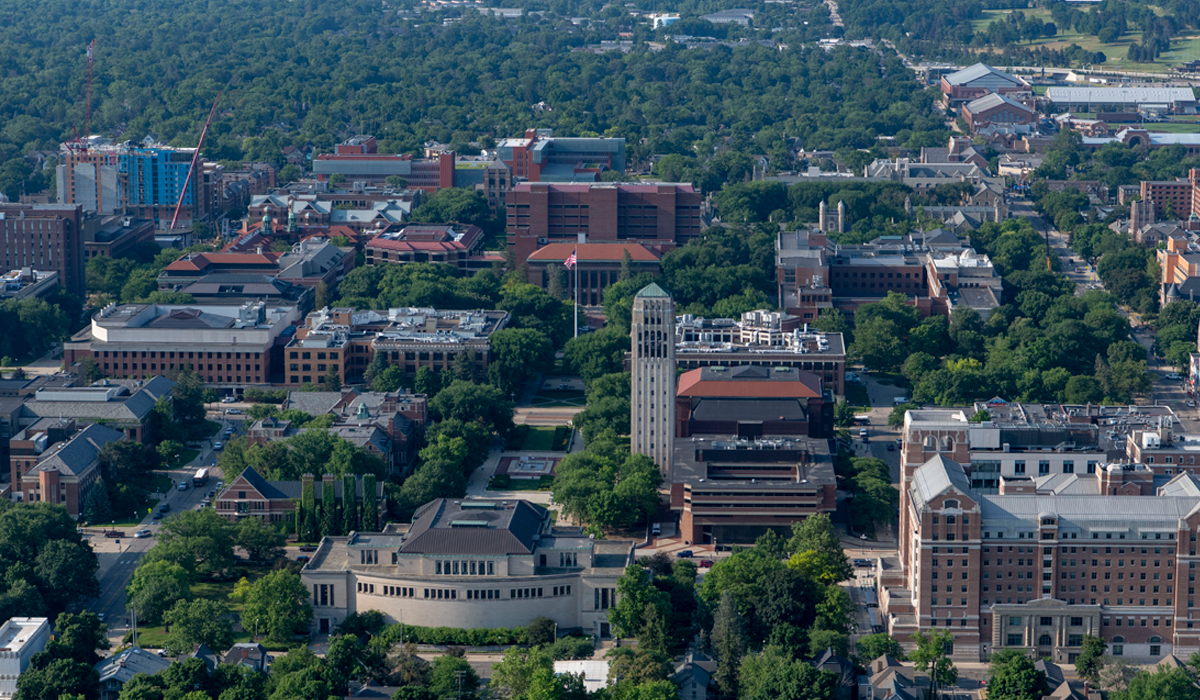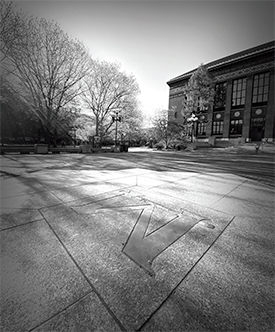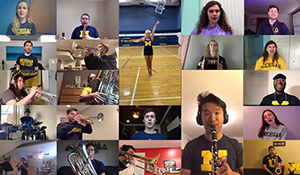Ann Arbor has been described as “24.6 square miles surrounded by reality,” but reality put the lie to that statement while casting a shadow over life at the University during most of 2020.
At the beginning of the year, “coronavirus” was a little-known term used in distant conversations about a virus spreading throughout China. It was hard to image how it could affect faculty, staff, and students as they returned to campus in January. But within mere months, everything changed. And for the remainder of the year, the University fought to find familiar rhythms of daily life.
Much of this played out as the death of George Floyd upset the nation, causing a profound impact on the University community. And investigations started to bring to light past cases of sexual misconduct by University staff.
As this “annus horribilis” closes out, Michigan Alumnus takes a look back while wishing readers a happier, healthier, more hopeful 2021.
Jan. 8
Students, faculty, and staff have returned to campus following the holiday break for the start of winter term classes.
Jan. 13
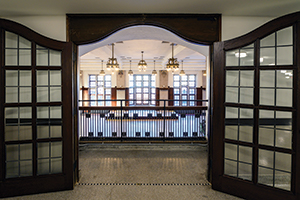
Among the brighter moments of the year, the Michigan Union reopens after a 20-month, $85.2 million renovation. The community celebrates with an open house featuring speakers, the Marching Band, and the opportunity to see the refurbished spaces.
Feb. 19
The University asks former patients of the late U-M physician Robert E. Anderson who believe they were subjected to sexual misconduct during a medical exam to contact a U-M hotline. The action follows an investigation that began in 2018 when a former student-athlete wrote to Athletic Director Warde Manuel to detail abuse during medical exams by Anderson in the early 1970s.
March 5
The University announces it will offer free confidential counseling to individuals affected by the alleged sexual misconduct by Anderson and Provost Martin Philbert, who had been placed on administrative leave Jan. 22.
March 5
While students are away on winter term break (March 2-6), U-M President Mark Schlissel sends the first in a series of COVID-19 updates to the U-M community, including preparations the University is making for coronavirus emergencies.
March 10
Michigan Gov. Gretchen Whitmer announces two presumptive cases of COVID-19 in the state, one of whom is being treated at Michigan Medicine. She also declares a state of emergency in response to these cases.
March 11
Philbert is removed as executive vice president for academic affairs and provost based on information that came to light during a sexual misconduct investigation.
March 12-13
Due to COVID-19, the University cancels all classes and most events on all three campuses and encourages students who can do so to move home as soon as possible. U-M also suspends most international travel and alters or suspends education abroad programs. In response to the Big Ten Conference canceling the remainder of the winter and spring sports seasons, U-M suspends all athletic activities. The University encourages all managers to provide opportunities for employees to work remotely when possible while keeping their units open for business.
March 16
Classes resume remotely in alternative formats through April 21, the last day of classes for the semester.
March 23
University Housing informs students who remain on campus that they will be consolidated into North Quad, South Quad, and West Quad.
April 23-30
All final exams take place remotely in alternative formats.
May 2
Spring Commencement events originally scheduled for April 30-May 3 are canceled. Instead, the University celebrates 2020 graduates with online and social media content, including a message from former Vice President Al Gore. He had been the planned commencement speaker.
May 5
All spring and summer term courses at all three campuses commence, remotely in alternative formats.
May 30
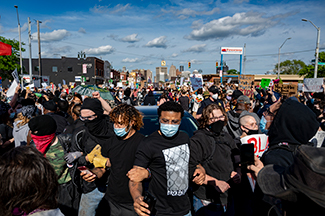
Following the May 25 death of George Floyd at the hands of Minneapolis police, hundreds gather on the Diag and march through Ann Arbor to protest police brutality against Black Americans. In the coming months, the University will announce anti-racism initiatives.
June 22
U-M announces plans to launch its fall semester with a blend of in-person and remote classes, an adjusted academic calendar, and an emphasis on the use of face coverings, social distancing, and other public health measures.
June 23
The University cancels plans to host the second of three U.S. presidential debates. However, it proceeds with its Democracy & Debate theme semester. In his letter to the Commission on Presidential Debates, Schlissel cites “the scale and complexity of the work we are undertaking to help assure a safe and healthy fall for our students, faculty and staff.”
July 16
The U-M board of regents appoints Susan Collins provost and executive vice president for academic affairs. She had been serving as interim provost since Jan. 30, following the Jan. 22 departure of Martin Philbert.
July 31
The “Report of Independent Investigation: Allegations of Sexual Misconduct by Martin A. Philbert” describes multiple instances of sexual harassment by the former provost. In an Aug. 3 email to the Ann Arbor campus community, Schlissel apologizes to everyone affected by Philbert’s misconduct and the institution’s failings.
Aug. 31
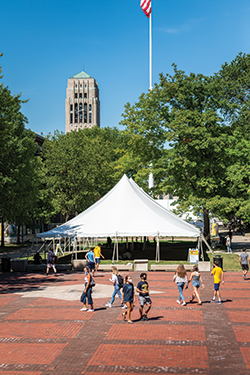
Fall term classes begin, with marked differences on campus — from signs encouraging social distancing and mask wearing to modified grading and outdoor canopies that provide additional space. In addition, a comprehensive website called the Campus Maize & Blueprint provides guidelines and updates as well as the COVID-19 Dashboard for the Ann Arbor campus.
Sept. 16
Members of the Graduate Employees’ Organization vote to end a strike that started Sept. 8 and resulted in an initial four-day work stoppage that extended into the following week. The union organized throughout the summer around eight demands related to COVID-19 and anti-policing on campus.
Sept. 16
The Big Ten Conference announces the return of the 2020 football season. Previously canceled along with other sports due to COVID-19, football resumes the weekend of Oct. 23-24. But an increasing number of positive COVID-19 cases and student-athletes in quarantine results in the cancellation of the Dec. 5 game against Maryland and the Dec. 12 game at Ohio State – the first time the archrivals have not played since 1917.
Oct. 20
As a national reckoning on race continues, the University announces it will launch several new anti-racism initiatives and enhance a number of existing ones. Among the many initiatives are the new George Floyd Memorial Scholarship, the hiring of at least 20 new full-time faculty members in the next three years with scholarly expertise in racial inequality and structural racism, and the creation of a task force on policing and public safety for the Ann Arbor campus.
Nov. 3
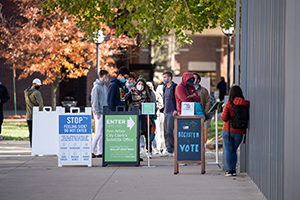
Students turn out in large numbers on Election Day. In precincts that contain university-affiliated student housing, 9,234 ballots are cast, compared with 5,842 in those precincts in 2018. The turnout rate for those precincts was approximately 31% in 2018 and approximately 40% in 2020. The increased engagement of individuals living in those precincts comes despite the fact that University housing operated with reduced capacity during 2020 fall semester.
Nov. 6
The University announces a plan for the 2021 winter term that includes more remote courses, fewer undergraduates living on campus, and more widely available COVID-19 testing. The plan draws on public health guidance, feedback from the campus community, and lessons learned from the fall term. Previously, on Sept. 28, the University canceled winter 2021 study abroad programs.
Nov. 20
Per the plans announced in June, the last in-person classes are held for the fall semester. However, due to a Nov. 15 order from Michigan Gov. Gretchen Whitmer, HLDD’19, to curb the spread of the virus, 90% of all undergraduate classes on the Ann Arbor campus are already taught remotely. After Thanksgiving break, classes resume remotely from Nov. 30 until Dec. 8 to reduce travel to and from campus. Instead of December commencement, graduates are invited to participate in spring ceremonies as they normally are.
Dec. 3
At the U-M board of regents meeting, President Mark Schlissel announced the hiring of Guidepost Solutions, a consulting firm with experience counseling clients on preventing workplace sexual misconduct and in the higher education sector. The firm will collaborate with the University community in the coming year to implement recommendations made in a July 31 report on the investigation of sexual misconduct by former provost Philbert.

